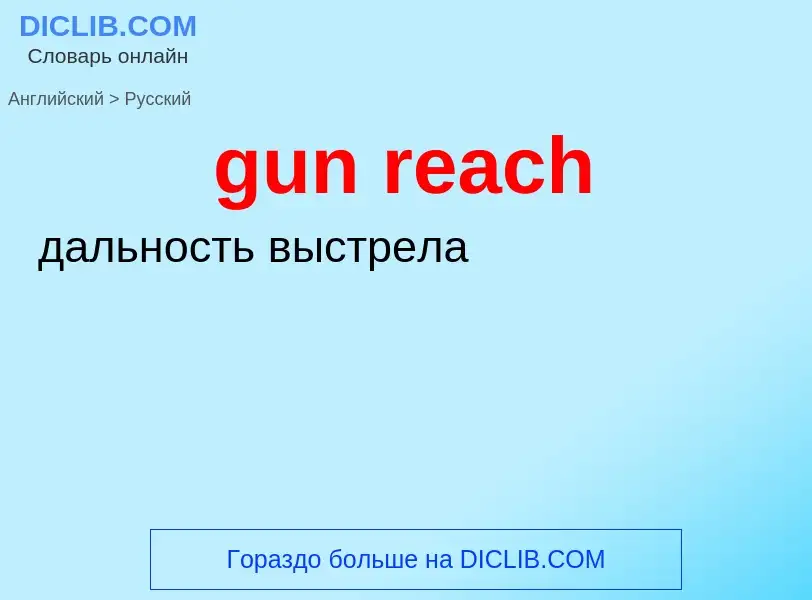Vertaling en analyse van woorden door kunstmatige intelligentie ChatGPT
Op deze pagina kunt u een gedetailleerde analyse krijgen van een woord of zin, geproduceerd met behulp van de beste kunstmatige intelligentietechnologie tot nu toe:
- hoe het woord wordt gebruikt
- gebruiksfrequentie
- het wordt vaker gebruikt in mondelinge of schriftelijke toespraken
- opties voor woordvertaling
- Gebruiksvoorbeelden (meerdere zinnen met vertaling)
- etymologie
gun reach - vertaling naar russisch
[ri:tʃ]
общая лексика
радиус действия
колено реки
плёс
бьеф
договариваться
достигать
доходить
простирание
простираться
строительное дело
вылет (напр. стрелы)
участок (реки, канала)
нефтегазовая промышленность
область действия
зона досягаемости
вынос стрелы
существительное
[ri:tʃ]
общая лексика
только
протягивание (руки и т. п.)
размах
досягаемость
доступность
радиус действия
дистанция удара (бокс)
круг
уровень (знаний и т. п.)
кругозор
охват
круги (общества)
область (воздействия)
протяжение
пространство
полоса (территории)
колено реки
плёс
бьеф
прямой участок (дороги)
перегон
этап (пути)
ездка
протягивание (руки и т. п.)
предел досягаемости, досягаемость
область влияния, охват
сфера
протяжение, пространство
плес
железнодорожное дело
длина плеча
морской термин
галс
глагол
общая лексика
протягивать
вытягивать (особ. руку)
простирать
вытягиваться
протягиваться
(часто for) дотягиваться
тянуться (к чему-л., за чем-л.)
доставать
брать
простираться
доходить (до какого-л. места)
охватывать
проникать (куда-л.; о звуке, свете)
достигать (слуха и т. п.)
доезжать
доходить
добираться
прийти (к чему-л.)
достичь
добиться
доживать
(часто to
into) составлять (какое-л. количество)
достигать
распространяться (на что-л.)
трогать
пронимать
производить впечатление
оказывать влияние
(обыкн. after) стремиться (к чему-л.)
добиваться
искать (чего-л.)
дотягиваться
достигать, доходить
застать, настигнуть
доезжать до
добираться до
составлять (сумму)
связаться (с кем-л., напр., по телефону)
сноситься, сообщаться (с кем-л.)
разговорное выражение
передавать
подавать (иногда reach over)
связаться (с кем-л. по телефону и т. п.)
устанавливать контакт
сноситься
сообщаться (с кем-л.)
застать (дома и т. п.)
попасть (пулей, камнем)
задеть
ранить (в фехтовании и т. п.)
нанести удар
ударить (в боксе и т. п.)
«подъехать» (к кому-л.)
«обработать» (кого-л.)
подкупить (свидетеля и т. п.)
поэтическое выражение
понимать
постигать
редкое выражение
хватать
быть достаточным для чего-л. (to)
собирательное выражение
передавать, подавать
синоним
антоним
Смотрите также
Definitie
Wikipedia
In the application of statistics to advertising and media analysis, reach refers to the total number of different people or households exposed, at least once, to a medium during a given period. Reach should not be confused with the number of people who will actually be exposed to and consume the advertising, though. It is just the number of people who are exposed to the medium and therefore have an opportunity to see or hear the ad or commercial. Reach may be stated either as an absolute number, or as a fraction of a given population (for instance 'TV households', 'men' or 'those aged 25–35').
For any given viewer, they have been "reached" by the work if they have viewed it at all (or a specified amount) during the specified period. Multiple viewings by a single member of the audience in the cited period do not increase reach; however, media people use the term effective reach to describe the quality of exposure. Effective reach and reach are two different measurements for a target audience who receive a given message or ad.
Since reach is a time-dependent summary of aggregate audience behavior, reach figures are meaningless without a period associated with them: an example of a valid reach figure would be to state that "[example website] had a one-day reach of 1565 per million on 21 March 2004" (though unique users, an equivalent measure, would be a more typical metric for a website).
Reach of television channels is often expressed in the form of "x minute weekly reach" – that is, the number (or percentage) of viewers who watched the channel for at least x minutes in a given week.
For example, in the UK, BARB defines the reach of a television channel as the percentage of the population in private households who view a channel for more than 3 minutes in a given day or week. Similarly, for radio, RAJAR defines the weekly reach of a radio station as the number of people who tune into a radio station for at least 5 minutes (within at least one 15 min period) in a given week.
Reach is an important measure for the BBC, which is funded by a mandatory licence fee. It seeks to maximise its reach to ensure all licence fee payers are receiving value. Reach and frequency of exposure are also two of the most important statistics used in advertising management. When reach is multiplied by average frequency a composite measure called gross rating points (GRPs) is obtained. Reach can be calculated indirectly as: reach = GRPs / average frequency.

